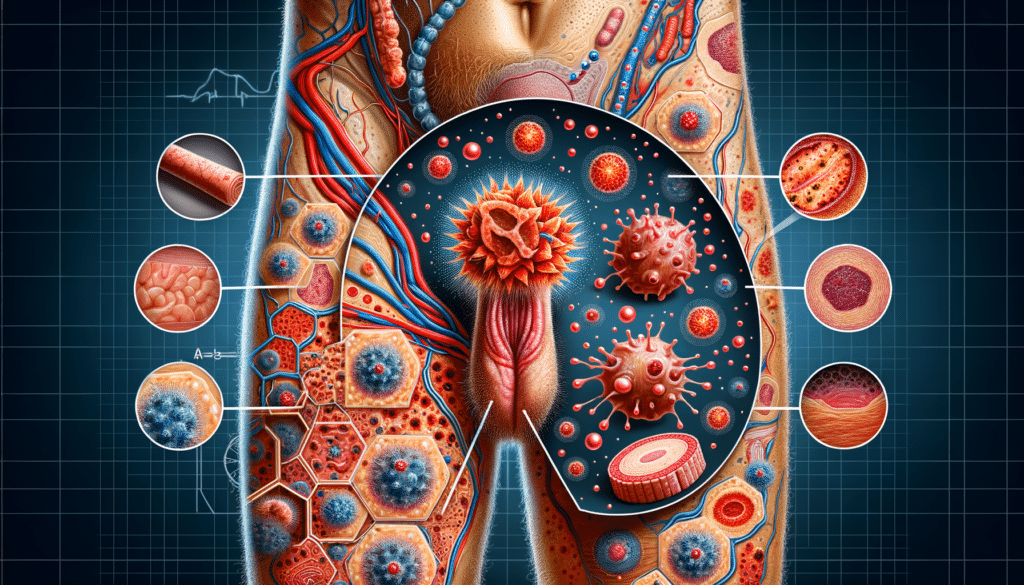The Education Blog

Introduction
Psoriasis is a chronic skin condition that affects millions worldwide, and when it manifests in the genital area, it can be particularly challenging both physically and emotionally. Understanding genital psoriasis is crucial for effective management and treatment. This article delves into the causes and symptoms of genital psoriasis, offering insights and guidance for those affected.
What is Genital Psoriasis?
Genital psoriasis is a form of psoriasis that specifically affects the skin around the genital area. Unlike other types of psoriasis that may present with thick, scaly patches, genital psoriasis often appears as smooth, red lesions. The delicate nature of the skin in this region means that symptoms can be more pronounced and uncomfortable.
Psoriasis is an autoimmune condition where the immune system mistakenly attacks healthy skin cells, leading to rapid skin cell production. This overproduction results in the characteristic patches of psoriasis. In the genital area, these patches can cause significant discomfort and may be mistaken for other conditions such as infections or dermatitis.
It’s important to recognize that genital psoriasis is not contagious and cannot be transmitted through sexual contact. However, its presence can impact a person’s quality of life, leading to issues with self-esteem and intimacy. Understanding the unique presentation of genital psoriasis is the first step in managing its effects.
Common Causes of Genital Psoriasis
The exact cause of psoriasis is not fully understood, but it is believed to result from a combination of genetic and environmental factors. Genital psoriasis, like other forms, is thought to be triggered by an overactive immune system. Here are some common factors that may contribute to its development:
- Genetic Predisposition: A family history of psoriasis can increase the likelihood of developing the condition.
- Environmental Triggers: Stress, skin injuries, infections, and certain medications can trigger or exacerbate psoriasis flare-ups.
- Lifestyle Factors: Smoking and excessive alcohol consumption are known to worsen psoriasis symptoms.
It’s important to note that while these factors can contribute to the development of genital psoriasis, they do not guarantee its occurrence. Each individual’s experience with psoriasis is unique, and triggers can vary widely.
Symptoms of Genital Psoriasis
The symptoms of genital psoriasis can vary, but they often include:
- Red, Inflamed Skin: The affected area may appear red and swollen, often without the thick scales seen in other psoriasis types.
- Itching and Discomfort: The skin in the genital area is sensitive, and itching can be particularly intense, leading to discomfort during daily activities.
- Burning Sensation: Some individuals report a burning sensation, especially after urination or sexual activity.
These symptoms can be distressing and may affect a person’s mental health and relationships. It’s important to consult a healthcare provider for an accurate diagnosis and appropriate treatment plan.
Managing Genital Psoriasis
Managing genital psoriasis involves a combination of medical treatment and lifestyle adjustments. Here are some strategies that can help:
- Topical Treatments: Corticosteroids and other medicated creams can reduce inflammation and alleviate symptoms.
- Moisturizers: Keeping the skin hydrated can help reduce irritation and prevent flare-ups.
- Avoiding Triggers: Identifying and avoiding personal triggers, such as stress or certain hygiene products, can help manage symptoms.
- Healthy Lifestyle: Maintaining a balanced diet, exercising regularly, and avoiding smoking and excessive alcohol can improve overall skin health.
It’s essential for individuals with genital psoriasis to work closely with their healthcare provider to develop a personalized treatment plan. With the right approach, it’s possible to manage symptoms effectively and maintain a good quality of life.
Conclusion
Genital psoriasis, while challenging, is a manageable condition with the right knowledge and care. By understanding its causes and symptoms, individuals can take proactive steps towards effective management. Consultation with healthcare professionals and adherence to a tailored treatment plan can significantly improve outcomes. Remember, you are not alone in this journey, and support is available to help you navigate the challenges of living with genital psoriasis.









